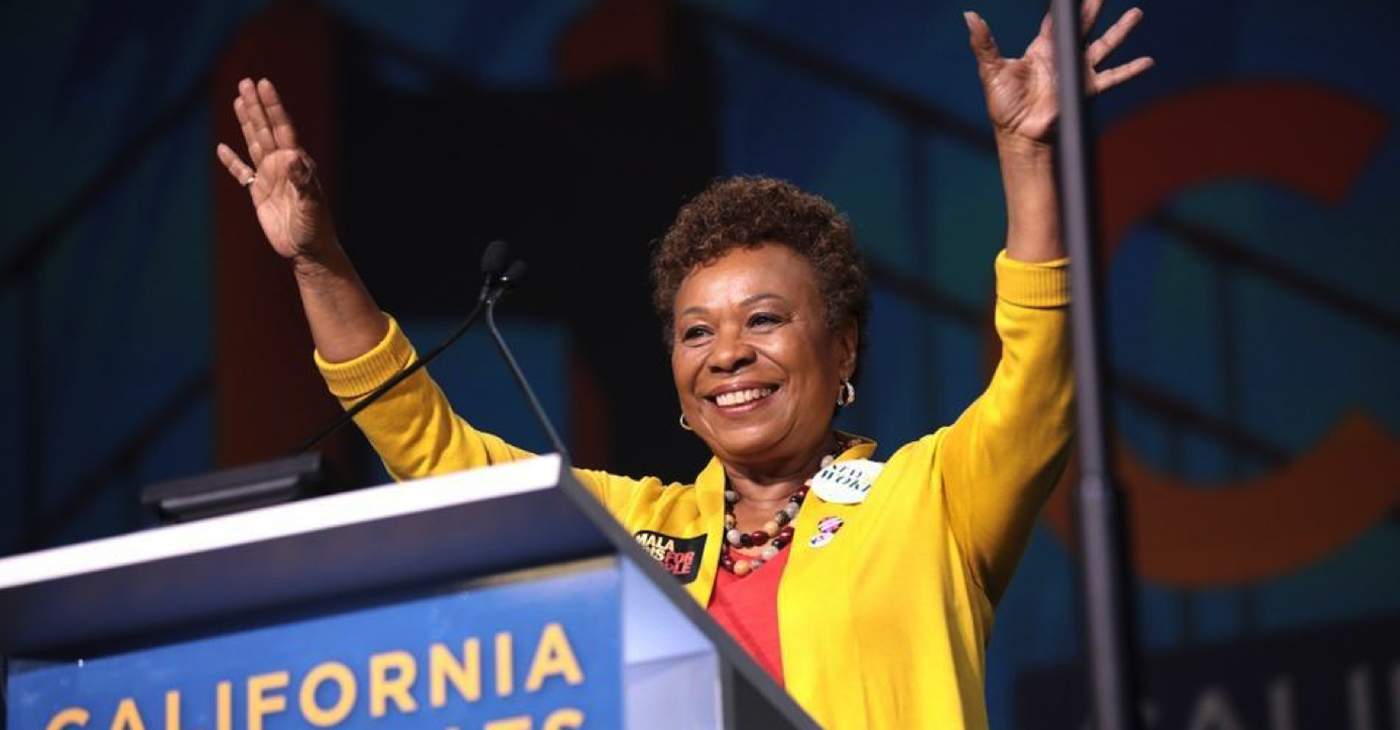Activism
Rep. Barbara Lee Joins Competitive Race to Replace Sen. Dianne Feinstein
Rep. Barbara Lee (D-CA12), the highest-ranking African American woman serving in the U.S. Congress, announced on February 21, that she will enter the race to replace 89-year-old Dianne Feinstein — California’s senior U.S. Senator who has announced that she will not seek another term.

By Tanu Henry
California Black Media
Rep. Barbara Lee (D-CA12), the highest-ranking African American woman serving in the U.S. Congress, announced on February 21, that she will enter the race to replace 89-year-old Dianne Feinstein — California’s senior U.S. Senator who has announced that she will not seek another term.
“No one is rolling out the welcome mat – especially for someone like me. I am the girl they didn’t allow in, who couldn’t drink from the water fountain, who had an abortion in a back alley when they all were illegal,” Lee said in a video she released announcing her senatorial bid. “I escaped a violent marriage, became a single mom, a homeless mom, a mom who couldn’t afford childcare and brought her kids to class with her.”
“By the grace of God, I didn’t let that stop me,” Lee said over a soundtrack of loudening applause. “And even though there are no African American women in the U.S. Senate, we won’t let that stop us either. Because when you stand on the side of justice, you don’t quit when they give you a seat at the table. You bring a folding chair for everyone, and they’re here to stay.”
A week earlier, Lee, a 12-term member of the U.S. House of Representatives who is known for her progressive politics, filed the required paperwork with the Federal Election Commission to be a candidate in the 2024 race.
“It has been an immense honor to serve alongside Senator Dianne Feinstein, the longest-serving woman senator in our nation’s history,” Lee said in a statement after Feinstein’s announcement. “For over two decades, we’ve worked closely together to represent the best interests of our great state of California; create an economy that works for all; and advance justice and equity.”
“The progress we’ve made in the fight for equity can be seen in the Senator’s tenure itself: when she was elected in ’92, there were just two women senators. Today, there are 25,” Lee said, continuing her homage to Feinstein.
If Lee wins, she will be the only Black woman serving in the U.S. Senate. Just two Black women, Vice President Kamala Harris and former Illinois Senator Carol Moseley Braun, have served in the upper house of the United States Congress in the body’s 230-year history.
“As one of the most liberal states in the nation, we must continue to send an independent voice who will be diverse in their perspective and positions,” said Kellie Todd-Griffin, founding convener of the California Black Women’s Collective, a statewide organization whose membership includes women representing various professional backgrounds.
“That is Congressmember Barbara Lee. She speaks for all of us,” added Griffin.
In 2020, after Kamala Harris became vice president, Black women advocates across California called on Gov. Gavin Newsom to appoint a Black woman to replace her. They made the case that there would be no other Black woman in the Senate after Harris left, and that Black women are the most loyal, most powerful, and most consistent voting bloc in the Democratic Party.
Instead, Newsom appointed Sen. Alex Padilla, the first Latino from California to serve in the U.S. Senate. Although Black political advocates and Black leaders in the California Democratic Party eventually embraced Padilla’s nomination, many felt Newsom’s decision to not appoint a Black woman to replace Harris was a slap in the face.
“That is a terrible loss for America. That is our seat,” said Amelia Ashley Ward, publisher of the San Francisco Sun-Reporter, after Padilla was nominated. “It was won by an African American woman, and she had hundreds of thousands of African American women working hard with her, holding her up, standing behind her to win that seat.”
Lee, 76, will be competing for Feinstein’s Senate seat against two other Democratic members of California’s delegation to the U.S. House of Representatives: Katie Porter (D-CA-47), 49, and Adam Schiff (D-CA-30), 62.
Both Porter and Schiff, like Lee, have progressive voting records. Both Democratic competitors have already amassed tens of millions of dollars, respectively, in campaign donations. Their early fundraising places them in a stronger position than Lee to win the 2024 Democratic primary which will be held about a year from now.
In the U.S. House, Lee serves as co-chair of the Policy and Steering Committee. She is also a member of the Appropriations and Budget committees. She is former chair of the Congressional Black Caucus and chair emeritus of the Congressional Progressive Caucus.
Lee has also been hailed by her Democratic colleagues as the only member of Congress who had the courage to vote against the use of force in Iraq after the Sept. 11, 2001, attacks.
As a young activist, Lee was a volunteer for the 1973 Oakland mayoral campaign of Black founder co-founder Bobby Seale.
Griffin says for Black women particularly, and for African Americans in general, it is important to have representation in the United States Senate.
“Congressmember Lee has been a progressive leader whose record demonstrates she will fight to solve the issues that impact our community.
She has effectively served California by advancing meaningful policy while standing up for the things that matter to everyday citizens,” said Griffin.
Activism
Oakland Post: Week of April 10 – 16, 2024
The printed Weekly Edition of the Oakland Post: Week of April 10 – 16, 2024

To enlarge your view of this issue, use the slider, magnifying glass icon or full page icon in the lower right corner of the browser window. ![]()
Activism
Oakland Post: Week of April 3 – 6, 2024
The printed Weekly Edition of the Oakland Post: Week of April 3 – 6, 2024

To enlarge your view of this issue, use the slider, magnifying glass icon or full page icon in the lower right corner of the browser window. ![]()
Activism
Oakland Post: Week of March 27 – April 2, 2024
The printed Weekly Edition of the Oakland Post: Week of March 27 – April 2, 2024

To enlarge your view of this issue, use the slider, magnifying glass icon or full page icon in the lower right corner of the browser window. ![]()
-

 Activism4 weeks ago
Activism4 weeks agoOakland Post: Week of March 20 – 26, 2024
-

 #NNPA BlackPress3 weeks ago
#NNPA BlackPress3 weeks agoMayor, City Council President React to May 31 Closing of Birmingham-Southern College
-

 #NNPA BlackPress3 weeks ago
#NNPA BlackPress3 weeks agoFrom Raids to Revelations: The Dark Turn in Sean ‘Diddy’ Combs’ Saga
-

 #NNPA BlackPress3 weeks ago
#NNPA BlackPress3 weeks agoCOMMENTARY: D.C. Crime Bill Fails to Address Root Causes of Violence and Incarceration
-

 #NNPA BlackPress3 weeks ago
#NNPA BlackPress3 weeks agoCOMMENTARY: Lady Day and The Lights!
-

 #NNPA BlackPress3 weeks ago
#NNPA BlackPress3 weeks agoBaltimore Key Bridge Catastrophe: A City’s Heartbreak and a Nation’s Alarm
-

 #NNPA BlackPress3 weeks ago
#NNPA BlackPress3 weeks agoBaltimore’s Key Bridge Struck by Ship, Collapses into Water
-

 Activism3 weeks ago
Activism3 weeks agoOakland Post: Week of March 27 – April 2, 2024


































